新课标高中英语必修一unit2学案
- 格式:doc
- 大小:69.50 KB
- 文档页数:6
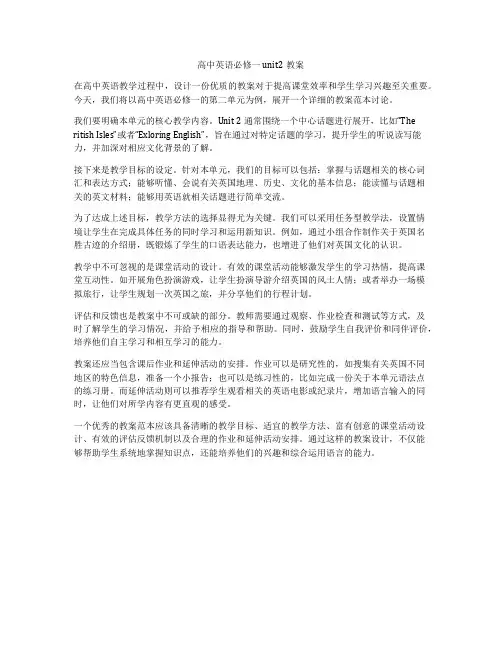
高中英语必修一unit2教案在高中英语教学过程中,设计一份优质的教案对于提高课堂效率和学生学习兴趣至关重要。
今天,我们将以高中英语必修一的第二单元为例,展开一个详细的教案范本讨论。
我们要明确本单元的核心教学内容。
Unit 2通常围绕一个中心话题进行展开,比如“The ritish Isles”或者“Exloring English”,旨在通过对特定话题的学习,提升学生的听说读写能力,并加深对相应文化背景的了解。
接下来是教学目标的设定。
针对本单元,我们的目标可以包括:掌握与话题相关的核心词汇和表达方式;能够听懂、会说有关英国地理、历史、文化的基本信息;能读懂与话题相关的英文材料;能够用英语就相关话题进行简单交流。
为了达成上述目标,教学方法的选择显得尤为关键。
我们可以采用任务型教学法,设置情境让学生在完成具体任务的同时学习和运用新知识。
例如,通过小组合作制作关于英国名胜古迹的介绍册,既锻炼了学生的口语表达能力,也增进了他们对英国文化的认识。
教学中不可忽视的是课堂活动的设计。
有效的课堂活动能够激发学生的学习热情,提高课堂互动性。
如开展角色扮演游戏,让学生扮演导游介绍英国的风土人情;或者举办一场模拟旅行,让学生规划一次英国之旅,并分享他们的行程计划。
评估和反馈也是教案中不可或缺的部分。
教师需要通过观察、作业检查和测试等方式,及时了解学生的学习情况,并给予相应的指导和帮助。
同时,鼓励学生自我评价和同伴评价,培养他们自主学习和相互学习的能力。
教案还应当包含课后作业和延伸活动的安排。
作业可以是研究性的,如搜集有关英国不同地区的特色信息,准备一个小报告;也可以是练习性的,比如完成一份关于本单元语法点的练习册。
而延伸活动则可以推荐学生观看相关的英语电影或纪录片,增加语言输入的同时,让他们对所学内容有更直观的感受。
一个优秀的教案范本应该具备清晰的教学目标、适宜的教学方法、富有创意的课堂活动设计、有效的评估反馈机制以及合理的作业和延伸活动安排。
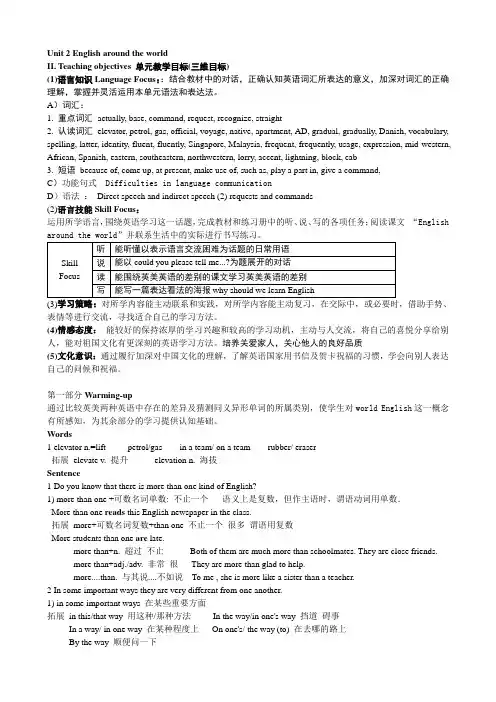
Unit 2 English around the worldII. Teaching objectives 单元教学目标(三维目标)(1)语言知识Language Focus::结合教材中的对话,正确认知英语词汇所表达的意义,加深对词汇的正确理解,掌握并灵活运用本单元语法和表达法。
A)词汇:1. 重点词汇actually, base, command, request, recognize, straight2. 认读词汇elevator, petrol, gas, official, voyage, native, apartment, AD, gradual, gradually, Danish, vocabulary, spelling, latter, identity, fluent, fluently, Singapore, Malaysia, frequent, frequently, usage, expression, mid-western, African, Spanish, eastern, southeastern, northwestern, lorry, accent, lightning, block, cab3. 短语because of, come up, at present, make use of, such as, play a part in, give a command,C)功能句式Difficulties in language communicationD)语法:Direct speech and indirect speech (2) requests and commands(2)语言技能Skill Focus:运用所学语言,围绕英语学习这一话题,完成教材和练习册中的听、说、写的各项任务;阅读课文“English around the world”并联系生活中的实际进行书写练习。
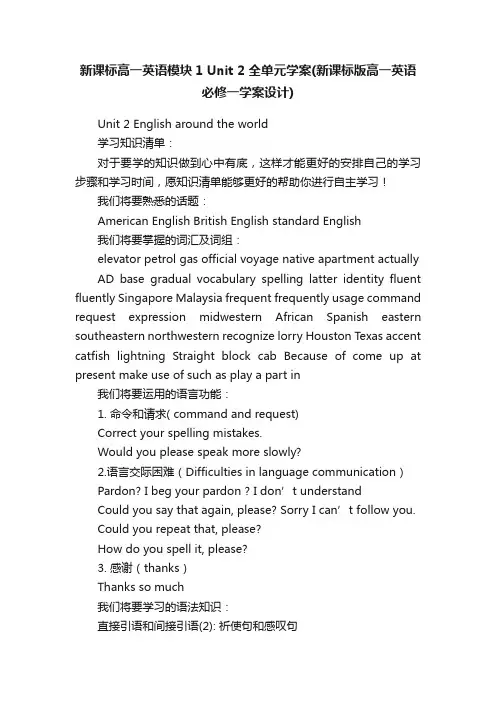
新课标高一英语模块1 Unit 2 全单元学案(新课标版高一英语必修一学案设计)Unit 2 English around the world学习知识清单:对于要学的知识做到心中有底,这样才能更好的安排自己的学习步骤和学习时间,愿知识清单能够更好的帮助你进行自主学习!我们将要熟悉的话题:American English British English standard English我们将要掌握的词汇及词组:elevator petrol gas official voyage native apartment actually AD base gradual vocabulary spelling latter identity fluent fluently Singapore Malaysia frequent frequently usage command request expression midwestern African Spanish eastern southeastern northwestern recognize lorry Houston Texas accent catfish lightning Straight block cab Because of come up at present make use of such as play a part in我们将要运用的语言功能:1. 命令和请求( command and request)Correct your spelling mistakes.Would you please speak more slowly?2.语言交际困难(Difficulties in language communication)Pardon? I beg your pardon ? I don’t understandCould you say that again, please? Sorry I can’t follow you.Could you repeat that, please?How do you spell it, please?3. 感谢(thanks)Thanks so much我们将要学习的语法知识:直接引语和间接引语(2): 祈使句和感叹句1. 祈使句“Please sit down and have a rest ."--She asked us to sit down and have a rest.2.感叹句He said ,“What a lovely day it is !” --He said what a lovely day it was.(或He said that it was a lovely day.)课前自主预习方案I. 重点单词 (能花十分钟把I和 II两部分的单词和词组在课本中查出来并写上吗?相信自己能够做到!查完了别忘了读一读记一记哦~~)1. (n)电梯;升降机(同义词)2. (n)(英)汽油(同义词)3.________(adj.)官方的;正式的;公务的; (n)办公室(n.)政府官员4. ________ (n) 航行;航海5. ________( adj.)本国的;本地的(n.)本地人;本国人 _______6. _________ (n)(美)公寓; (同义词) _______7. _________ (adj.)逐渐的; ________ (adv.)8. __________(adj.)实际上;事实上__________(adv)9. __________(adj.)流利的;流畅的(adv)__________10.________( adj.)频繁的;常见的(adv)__________II. 重点短语1. more __________one kind 不止一种2. _____the world 全世界3. _______ some important ways 在一些重要方面4. a large number_______ 大量的,许多的5. _______ fact 事实上,实际上6. because _______ 因为;由于7. come_______ 走近;上来;提出8. ________ present 现在9. Make use________ 利用;目前10.such ________ 例如;像这种的III. 语篇导读1)阅读The Road to Modern English, 然后完成下面的表格。
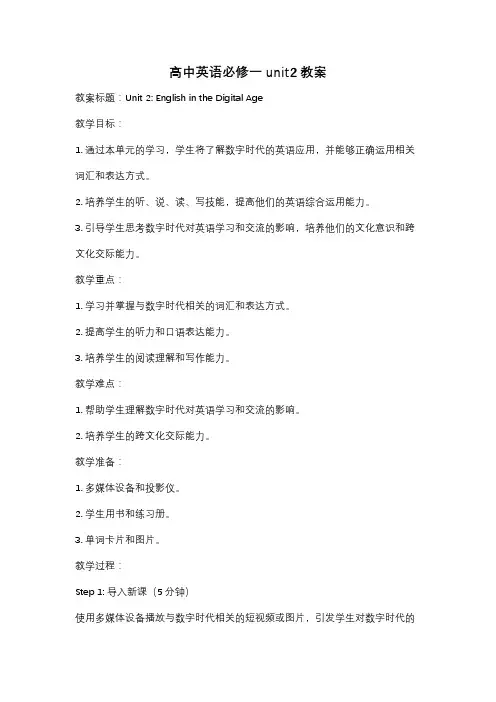
高中英语必修一unit2教案教案标题:Unit 2: English in the Digital Age教学目标:1. 通过本单元的学习,学生将了解数字时代的英语应用,并能够正确运用相关词汇和表达方式。
2. 培养学生的听、说、读、写技能,提高他们的英语综合运用能力。
3. 引导学生思考数字时代对英语学习和交流的影响,培养他们的文化意识和跨文化交际能力。
教学重点:1. 学习并掌握与数字时代相关的词汇和表达方式。
2. 提高学生的听力和口语表达能力。
3. 培养学生的阅读理解和写作能力。
教学难点:1. 帮助学生理解数字时代对英语学习和交流的影响。
2. 培养学生的跨文化交际能力。
教学准备:1. 多媒体设备和投影仪。
2. 学生用书和练习册。
3. 单词卡片和图片。
教学过程:Step 1: 导入新课(5分钟)使用多媒体设备播放与数字时代相关的短视频或图片,引发学生对数字时代的兴趣,并引导他们思考数字时代对英语学习和交流的影响。
Step 2: 学习新词汇(15分钟)教师通过多媒体展示数字时代相关的词汇,并逐一解释其意义和用法。
学生跟读并记忆新词汇,并使用单词卡片进行词汇复习和巩固。
Step 3: 听力训练(20分钟)教师播放与数字时代相关的听力材料,要求学生仔细听取并回答相关问题。
随后,教师与学生一起讨论听力材料中的内容,并帮助学生理解其中的关键信息。
Step 4: 阅读理解(20分钟)学生阅读与数字时代相关的短文或文章,并回答相关问题。
教师可以提供一些问题引导学生思考数字时代对英语学习和交流的影响,并引导学生进行讨论和分享。
Step 5: 口语练习(15分钟)学生分组进行口语练习,讨论数字时代对英语学习和交流的影响。
教师可以提供一些话题和问题,引导学生展开对话,并提供必要的语言支持和指导。
Step 6: 写作训练(20分钟)学生根据所学内容,撰写一篇关于数字时代对英语学习和交流的影响的短文。
教师可以提供写作指导和范文,帮助学生提高写作能力,并对学生的作文进行批改和评价。
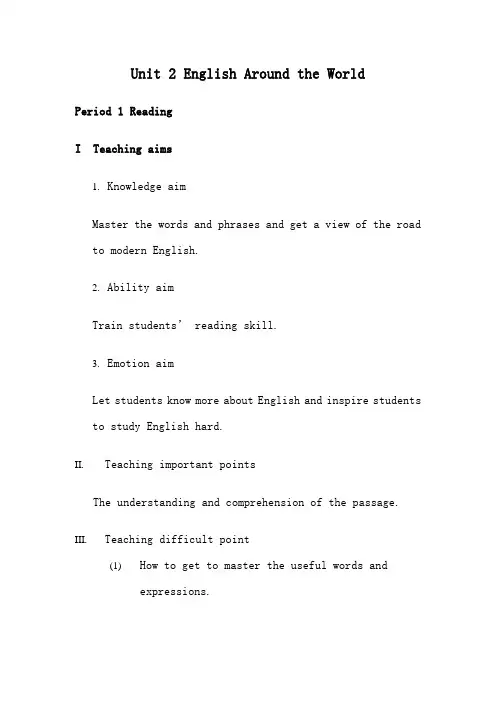
Unit 2 English Around the WorldPeriod 1 ReadingI Teaching aims1.Knowledge aimMaster the words and phrases and get a view of the road to modern English.2.Ability aimTrain students’ reading skill.3.Emotion aimLet students know more about English and inspire students to study English hard.II.Teaching important pointsThe understanding and comprehension of the passage.III.Teaching difficult point(1)How to get to master the useful words andexpressions.(2)How to improve students’ ability to read anarticle.IV. Teaching ProceduresStep1. Warming up1. Lead in: Show Ss a map of the world, and ask them thefollowing questions:1) How many languages are there in the world?2) How many English-speaking counties are there in theworld?3) How are you ever heard some differences betweenAmerican English and British English?Step2. Reading(1)SkimmingRead the passage quickly and find out the answers of the questions in comprehension.(2)Scanning(3)Listen to the tape and tell the meaning of each paragraph.1. Para1: Brief introduction of the change in English.2. Para.2: An example of different kinds of English.3. Para3: The development of English.Para4: English spoken in some other countries.(4)Post readingDiscussionSome people say that Chinese is a much more elegant language, so it is more important for us to master it and it is not so necessary to master foreign language. Do you agree with this opinion and why?1. Do you know that there is more than one kind of English in the world?你知道世界上英语的种类并不止一种吗?more than one +名词单数,后面的谓语动词用单数例如:More than one student wants to go to swim.2.In some important ways they are very different form one another.在某些重要的方面,它们彼此有些差异。

Unit2 English Around the World (学案)Period 1 Warming-up&reading◆Learning Aims(学习目标):1.知识目标:了解英语语种,拓宽学习视野,积累学科知识。
2.能力目标:训练阅读理解,培养阅读技能,增强阅读能力。
3.情感目标:胸怀爱国理念,树立高考意识,励志学好英语。
◆Key and Difficult Points(学习重难点):1.了解现代英语极其发展历程。
2.训练和培养英语阅读的方法与技巧。
◆Learning Methods(学习方法):1.查阅与积累2.自主学习与小组合作◆Learning Procedures(学习步骤):▼Finding before class(课前“百度”)Solve the following questions in some possible ways,such as going online、asking others or going to the library.Q1:How many languages are there in the world?Key:Q2:Which language is the most widely used language in the world?Key:▼Collecting in class(课堂记录)Collect some important information showsed by the teacher in class.Q1:Have you seen the word “Englishes”?Do you know the meaning of it?Key:Q2:Do you know the differences between BE and AE?What are the differences?Key:▼Self-learning(自主学习)Read the text according to the guide steps below and try to finish some related tasks.Step1 New words and phrases ( 熟悉新词)Step2 Guessing ( 猜词∕句子)Look at the title of the reading passage and then do the following exercise.Ex1.The word “road”means .The passage probably talks aboutStep3 Skimming(略读)Skim the passage and try to find out the topic sentence of each paragraph ,then underline them in your text book.Step4 Fast-reading(快读)Read the whole passage quickly ,then match the main idea of each part.Part1(Para1) A.English is spoken as a foreign language or secondlanguage in Africa and Risa.Part2(Para2) B.The spread of the English language in the world Part3(Para3-4) C.Native speakers can understand each other easily Para4(Para5) D.All languages change when cultures communicatewith one anotherStep 5 Careful-reading(细读)1.Read part(para1) and answer the following questions.Q1: How many people speak English at the end of the 16C?Key;Q2:Why did English begin to be spoken in many other countries in the 17 century? Key:2.Read part2(para2)and translate the first sentence into Chinese.Key:3.Read Part3(Para3-para4)and finish the following tasks.Task1:Choose the best answer according to the text.① Which statement is true?A. Languages always stay the same .nguages change only after warsnguages no longer changenguages change when cultures change②From AD450 to 1150 English sounded more like .A.FrenchB.ChineseC.GermanD.Russion③Who moved to America and then Australia?A.German settlersB.French settlersC.British settlersD.Danish settlers④ When was the English language finally settled?A.By the 19th centuryB.By the 18th centuryC.By the 1600’sD.At the end of the 17th century4.Read part 4(para5) and do the ture (T)or false(F) exercise.①English now is spoken as official language in South Asia.( )②India has the largest number of fluent English speakers.( )③Britain ruled India from 1765 to 1947.( )④Today the number of people learning English in China is growing rapidly.( )⑤China has the largest number of English learners.( )▼Cooperation(合作探究)1.Work with your members in your group to fill the blanks in the table below.The Road to Modern English▼Thinking after class (课后思考)1.Discussion:Will Chinese English become one of the world Englishes?2..Find the important and difficult words、phrases and sentences in the passage.。
![新课标人教版高一英语必修一unit2english around the world导学案(包含5个课时) [ 高考]](https://uimg.taocdn.com/0ced81fc26fff705cc170af9.webp)
Module 1 Unit 2 English around the world (Introduction & Vocabulary)编号:1 编写人:审核人:审批人:班组:姓名:组评:师评:日期:学习目标:本单元共60个词汇,熟练掌握32个,重点掌握14个。
通过自主学习,合作探究,利用构词法知识,熟记本单元的课标词汇。
激情投入,对英国英语和美国英语的差异有所了解,体验学习快乐。
Introduction:This unit seeks to give students a better understanding of how English developed and how it is spoken in the world. Students often hear talk about "Standard English". In fact, as this unit hopes to make clear, there is no such thing as one standard of spoken or written English.English is spoken in many countries throughout the world and many of them have different forms of expression. British English is spoken in those countries that were once part of the British Empire or influenced by the USA after the Second World War.Vocabulary第一部分:预习案1.请大声朗读下面的词汇elevator petrol official native apartment actually gradual vocabulary spelling latter identity fluent frequent command request expression African eastern recognize lorry voyagebase accent lighting straight block usagebecause of come up at present make use of such as play a part in请同学们用红笔标出自己在发音中存在困难的单词。
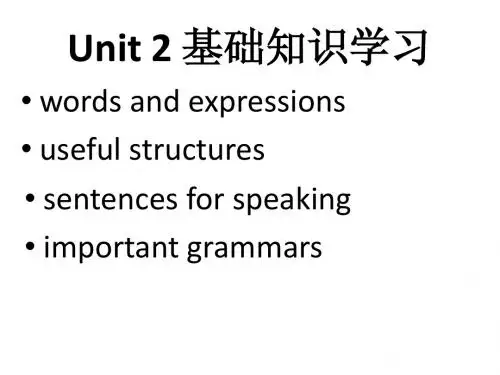
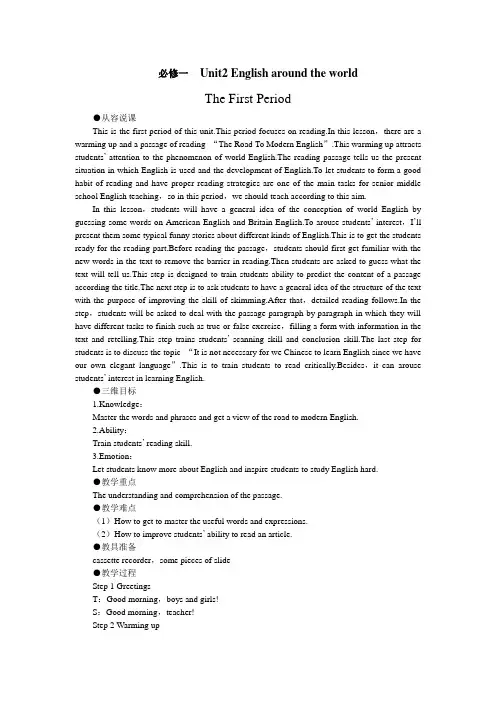
必修一Unit2 English around the worldThe First Period●从容说课This is the first period of this unit.This period focuses on reading.In this lesson,there are a warming up and a passage of reading “The Road To Modern English”.This warming up attracts students’ attention to the phenomenon of world English.The reading passage tells us the present situation in which English is used and the development of English.To let students to form a good habit of reading and have proper reading strategies are one of the main tasks for senior middle school English teaching,so in this period,we should teach according to this aim.In this lesson,students will have a general idea of the conception of world English by guessing some words on American English and Britain English.To arouse students’ interest,I’ll present them some typical funny stories about different kinds of English.This is to get the students ready for the reading part.Before reading the passage,students should first get familiar with the new words in the text to remove the barrier in reading.Then students are asked to guess what the text will tell us.This step is designed to train students ability to predict the content of a passage according the title.The next step is to ask students to have a general idea of the structure of the text with the purpose of improving the skill of skimming.After that,detailed reading follows.In the step,students will be asked to deal with the passage paragraph by paragraph in which they will have different tasks to finish such as true-or-false exercise,filling a form with information in the text and retelling.This step trains students’ scanning skill and conclusion skill.The last step for students is to discuss the topic “It is not necessary for we Chinese to learn English since we have our own elegant language”.This is to train students to read critically.Besides,it can arouse students’ interest in learning English.●三维目标1.Knowledge:Master the words and phrases and get a view of the road to modern English.2.Ability:Train students’ reading skill.3.Emotion:Let students know more about English and inspire students to study English hard.●教学重点The understanding and comprehension of the passage.●教学难点(1)How to get to master the useful words and expressions.(2)How to improve students’ ability to read an article.●教具准备cassette recorder,some pieces of slide●教学过程Step 1 GreetingsT:Good morning,boys and girls!S:Good morning,teacher!Step 2 Warming upT:English is a widely used language.Do you know in which countries English is spoken as their native language?S a:The US,the UK,Australia,Canada...T:(a slide:Nancy:Oh,there you are.Now then,did you have a good flight?Joe:Sure,we flew all the way direct from Seattle to London.Nancy:Y ou must be very tired.Did you sleep at all on the plane?Joe:No,not really.I’m very tired.Could I use your bathroom?Nancy:Why,of course.Y ou don’t need to ask,just make yourself at home.Let me give you a clean towel.Joe:A towel?Nancy:Y es.Here you are.The bathroom is upstairs.It’s the second door on the left.(After a while)Nancy:Have you found it?Joe:Well,eh,yes,I mean no.I mean,I found the bathroom,but I didn’t find what I was looking for!)Here is a short dialogue.Read it and discuss with your partner:What is it that Joe can’t find in the bathroom?Why can’t he find it?S b:It is the toilet.T:And why?S c:Perhaps when Joe says “bathroom”,he means a place,where there is a toilet.But in Nancy’s eyes,it is a place where people can only have a bath.T:Y ou are right.Do you know why there’s a misunderstanding between them?S d:Because they speak different kinds of English.T:Great.There’s more than one kind of English in the world.In some important ways they’re different.They’re called world English.Can you guess what they include?S e:Canadian,British,American,Australian and Indian English.T:Right.So you know even two native speakers of English may still not speak the same kind of English.Look at the examples on P9.Now try to guess which of the following words are British English and which are American English.Suggested answers:Am.English:mom;on a team;rubber;gasBr.English:mum;in a team;eraser;petrolStep 3 New WordsT:From today on,we’ll learn something about English around the world.First of all,let’s get familiar with the new words.Y esterday I asked you to read the new words and look up the meaning of them.Now let’s have a game in which one of you tells us the meaning or the explanation of the words and the others guess which word it is.Let’s go!Suggested explanation:1.include:have something or somebody as one of a group.e.g.:The tour included a visit to the Science Museum.2.play a role in:have a part in3.international:connected with two or more countries4.native:(1)connected with the place where you have always lived or have lived for a long time(2)a person who lives in a particular place,especially sb. who has lived there a long time5.elevator:lift6.flat:(1)having a smooth surface (2)(Br. E) a set of rooms for living in7.apartment:(Am. E) a set of rooms for living in8.modern:of the present time or recent timee up:to move toward10.culture:the customs and beliefs,art,way of life and social organization of a particular country or group11.actually:really;in fact12.present:(1)existing or happening now (2)being in a particular place13.rule:control14.vocabulary:all the phrases and phrases you learnage:the way in which words are used in a language16.identity:who or what sb./sth. isernment:the group of people who are responsible for controlling a country or a state18.rapidly:fastT:That’s great!Y ou’ve made a good preparation.Now please read the words together.(show words and explanations on the slide)Step 4 Pre-readingT:Just now,we’ve known that there’re many kinds of English in the world.Then why are there so many kinds?Ss:We don’t know.T:Anyway,we’ll find out the cause today.Now read the title of the passage “the road to modern English”.What do you think it will tell us?S f:I guess it will tell us the development of English.Step 5 SkimmingT:Now let’s find out whether your answer is right.So please read the passage fast in silence and find out the main idea of each paragraph.Suggested answer:Para.1:Brief introduction of the change in English.Para.2:An example of different kinds of English.Para.3:The development of English.Para.4:English spoken in some other countries.Step 6 ScanningT:Y ou’ve mastered the structure of the passage.Now please read para.1 and 2 loud in detail.T:(several minutes later)Have you finished?Here’re some statements of which some are right while some not.Read them and then tell whether they are true or false.If false,please find out the mistake and correct it.(slides:1.Most of the English speakers in the 16th century lived in England.2.More and more people use English as their first or 2nd language.3.The US has the largest number of English speakers.4.Native English speakers can understand everything because they speak the same kind of English.)S g:The first one is true.S h:The second one is true.S i:The third one is false.China has the largest number of English speakers.S j:The fourth one is false.Native English speakers may not be able to understand everything because they do not speak the same kind of English.T:Y ou did a very good job.Now please read para.3 after the tape.And then fill in the form on the screen.The Road To Modern EnglishThe cause:Cultures communicate with one anotherTime Things that happenedBetween AD 450and 1150Based on German1150 to 1500 Less like German;more like French→why?→because Frenchmen ruled England thenIn the 1600’s Shakespeare broadened the vocabulary.A big change in English,giving its own identity→why?→caused by “American Dictionary of the English language”written by Noah WebsterLater British people brought English to AustraliaT:We know culture communication brings about changes in English.Can you think of any effect that Chinese has on English?S k:In English there are some Chinese words such as gongfu,long time no see,...T:Great!With more closely communication of culture,English is changing more frequently.T:As we all know,English is spoken as the native language mostly in western countries.Then what about English in some other parts of the world?After reading the last paragraph,would you please say something about the present situation of English in your own words?S l:It is also spoken as a foreign or 2nd language in many other countries.For example,in India,it is used for government and education.In some African and Asian countries,it is also spoken,such as in South Africa,Singapore and Malaysia.While in China,the number of English speakers is increasing fast.T:Quite good.Step 7 DiscussionT:So far,we’ve known that English is becoming more and more important in China.It has been an important subject for Chinese students.But someone say that Chinese is a much more elegant language.So it is more important for us to master it and it is not so necessary for us to master a foreign language.Do you agree with this opinion and why?Suggested answer:I don’t agree with it.With the cultural communication becoming more and more frequent,the chance to contact foreigners,exported goods,international conferences,and so on,is more and more.As the most widely used language,English is regarded as the language used in most international situations.Thus,if we want to keep up with the times,we’d better master English and use it as a tool.Step 8 Summary and homeworkT:Today we’ve learned an article on “the road to modern English”.After class,you should read it again and again to get the idea of the text further.Do the exercises of comprehending and try to tell your partner something about English in our own words.That’s all for today.Class is over.●板书设计Unit 2 English around the worldThe First PeriodNew words:Main idea of each para-graph:... ...... ...●活动与探究This activity is to make research into differences between different kinds of world English and some words from other languages in English.Divide students into two groups to do research and fill the following table in their free time.Differences Pronunciation Spelling MeaningUsage...Words from other languages Chinese Japanese French Spanish German...●备课资料Soon There Will Be No Such Thing As “Wrong”English In this article:Senior Indian journalist Gautaman Bhaskaran says that English is so flexible that one day there will be too many variations around the world.English is a victim of its own success.The other day The Times in London displayed a cartoon showing an excited schoolboy flaunting his test scores:“I done good in English.”Days later,editors of the Oxford Dictionary of English rued the spread of what they termed “greengrocer’s English”.Grammar and syntax,they regretted,were going out of fashion.Others in England—in the Oxford University Press,the BBC and so on—said the incorrect use of cliches were marring the smooth flow of a great language whose ability to imbibe and absorb has been one important reason for its success.This success also stems from the language’s unique position of being the only one spoken in most parts of the world.Really,English has no boundaries.Even in countries such as Japan and China,which were not colonized by Britain,English is making a determined “conquest”.Unfortunately,such a conquest is not always welcome because a language sometimes doubles as a political weapon.At some point it ceases to be just a means of communication and English is a classic example of this.It has always led a troubled life.It has been disliked,even hated,largely because the people who originally spoke English conquered,colonized and terrorized half the world,or just about.The animosity to the language continues,at least in some places.The bitterness that the French,for instance,have for English is a good example of a language being giving a quasi-political role in society.Fortunately,this aversion does not run as it did some years ago,and there is a growingrealization that English is the lingua franca.China and Japan,among a host of other nations,have been making serious efforts to promote the language.Some months ago there was a hue and cry in Singapore over the spread of “terrible English”which the authorities called “Singlish”.“Down with it!”they said,and urged Singaporeans to learn correct English,the phenomenal flexibility of which has often made things difficult for those who have to use it every day.Today even university graduates find it hard to pen a couple of correct sentences in it.More horrifying is that many teachers and university vice-chancellors speak and write poor and ungrammatical English.Often,they are found to be out of touch with what is called “usage”and,as we all know,this is one of the pillars the language rests on.Y et,despite the mess that English is in India,the nation has—more than two centuries after Samuel Johnson wrote his English dictionary—become the hottest destination for top lexicographers.The new 10th revised edition of the Oxford Concise English Dictionary inc ludes hundreds of Indian words.Leading the list of 600 Indian English entries are “Hindutva”(Hindu identity),“dada”(older brother),“panchayat”(local administration),“chai”(tea),“pani”(water),“puri”(a dish made of wheat)and “dosa”(rice pancake).In fact,Indian words from 20 per cent of entries and rank as the third-largest component after American and Australian English segments.Other former British colonies such as New Zealand,South Africa and the Caribbean islands follow the Indian English collection of words.English,despite its hiccups,is endearing to the common Indian man or woman.About 150 years after Lord Macaulay introduced the language in India to create “babus”(clerks)for the British bureaucracy,70 million Indians speak English,a number that is higher than that in Britain.However,there is a sneaking fear among Puritans that with this kind of spread,English may stop being English.While the French have fanatically preserved the purity of their language,the English have liberally allowed other influences to affect their lingo.So,what is seen as its strength —the fact that people all over the world understand it—can be an undermining obstacle.There might be a serious problem if every state or continent were to have its own version of English.As one writer said:“There is a risk in relentless atomization.”With too many variations of the language,a time may come when one group of English-speaking people may not be able to understand another.This is happening.Hear the way Singaporeans speak English.Listen to the Australians pronouncing “e”;it sounds like “a”.A few of the films made lately by British directors Ken Loach and Mike Leigh had to have subtitles in English.Accents in the north of Britain can be hard for people in the south to understand,let alone those outside the island.The point is,no language must be allowed such flexibility—anything goes in the name of functional communication—that people begin to take liberties with it.Ultimately,there may be no such thing as wrong English.The schoolboy in the Times cartoon was doing just that.He knew nobody would scold him for getting his English wrong.不久以后就没有“错误的”英语这一说了英语成了自身成功的牺牲品,前几天,伦敦的《泰晤士报》刊登了一幅漫画,上面画了一个兴高采烈的男学生炫耀他的考试成绩:“I done good in English”(我的英语成绩不错)。
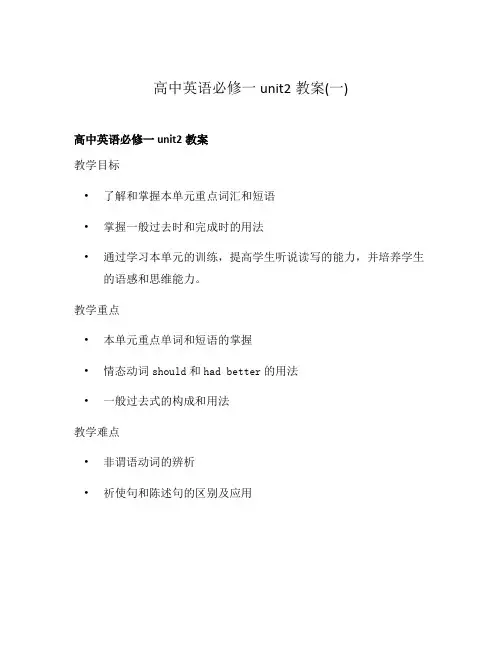
高中英语必修一unit2教案(一)高中英语必修一unit2教案教学目标•了解和掌握本单元重点词汇和短语•掌握一般过去时和完成时的用法•通过学习本单元的训练,提高学生听说读写的能力,并培养学生的语感和思维能力。
教学重点•本单元重点单词和短语的掌握•情态动词should和had better的用法•一般过去式的构成和用法教学难点•非谓语动词的辨析•祈使句和陈述句的区别及应用教学过程Step 1 词汇学习•通过黑板展示或PPT等方式,介绍本单元重点词汇和短语,并让学生掌握拼写和发音。
•使用单词卡片或词汇表等形式进行课外复习。
Step 2 语法学习1.一般过去式的构成和用法–表示过去发生的动作或状态,一般用于完成过去的事件或动作。
–构成:动词+ed–变形:•be动词的一般过去式:was/were•动词过去式的不规则变化。
2.完成时的用法–表示一般过去时或现在完成时的实现。
–构成:have/has+过去分词–它通常与表示一段时间的时间状语连用。
Step 3 阅读理解1.让学生阅读教材中的短文,并理解文章中出现的重点词汇和短语。
2.采用问答、填空、补全、选择等方式检验学生对文章的理解程度。
Step 4 口语练习1.将学生分为小组,让他们进行慢速阅读,并通过讨论的方式理解文章。
2.要求每组同学准备一段对话或演讲,表达出自己对文章的理解。
3.通过模拟真实场景进行口语交流练习。
Step 5 书写训练•让学生针对本单元出现的短语和句型进行书写训练,如祈使句,过去时和完成时等。
Step 6 作业布置•要求学生掌握本单元的重点词汇和语法,并完成指定的作业,如翻译句子等。
教学反思本节课的教学重点和难点解决得较好,学生积极参与讨论和互动,但在具体语法分析和词汇记忆等方面,学生还需再加强训练。
因此,建议后续加强师生互动,分组竞赛等方式,使学生更高效地掌握知识。
课堂拓展•可以通过观看相关英文电影或纪录片加深学生对所学知识的理解,提高学生的英文听力和口语水平。
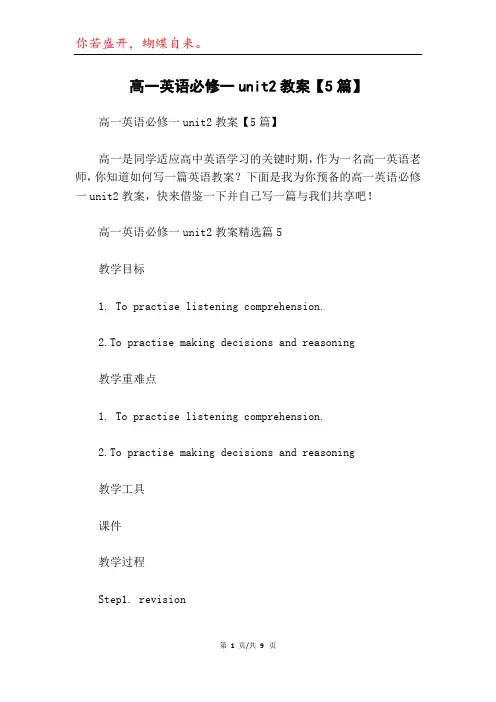
高一英语必修一unit2教案【5篇】高一英语必修一unit2教案【5篇】高一是同学适应高中英语学习的关键时期,作为一名高一英语老师,你知道如何写一篇英语教案?下面是我为你预备的高一英语必修一unit2教案,快来借鉴一下并自己写一篇与我们共享吧!高一英语必修一unit2教案精选篇5教学目标1. To practise listening comprehension.2.To practise making decisions and reasoning教学重难点1. To practise listening comprehension.2.To practise making decisions and reasoning教学工具课件教学过程Step1. revision1. check the homework exercises.1). It has been reported that children will be offered free education.It has been reported that free education will be offered to children.2). It has been said that we will be offered the latest computer science course book.It has been planned that the latest computer science course book will be offered to us.3). I have been told by Peter that I will be lent his notebook computer for a week.I have been told by Peter that his notebook computer will be lent to me for a week.2. Question: What can computers be used as?Step2. Lead-inAs we know, science and technology is developing very fast and computers have become smaller and smaller. They have been used in many fields. So, the 21st century is the century of information technology What does it mean? Does information technology/ IT only mean things like computers? Of cause not. Actually, it means more than computers. Computers are just one kind of IT. What else do you know is part of IT?(TV, radio, CD-ROM, DVD, books……)Step3. Listening (SB)1. Pre-listening: What are the changes brought by different forms of IT ?What are the advantages and disadvantages of them ?2. While-listening:Go through the chart and make sure the students look at the chart before they listen to the tape. (This is to sharpen their attention and listen for the answers. This will also help them get the gist of the text.) Then Listen to the tape and finish filling in the chart. (If necessary, play the tape for several times.)Say: After listening to their talk, we know all kinds of IT have both disadvantages and advantages.Let’s check the answers together.Type of IT Advantages DisadvantagesTV You can both listen and watch. You cannot write to friends.Web You can find information. It is very expensive.Radio You can listen to English. You cannot watch a film.Book You can get information. Sometimes it is out of date.3. Post-listening:1) (pair work): decide which type of IT is best for you to use right now. Make your choice and give your reasons by using the following expressions.I think that….In my opinion, ….I believe that….I agr ee because….I disagree because….I’ve decided that….2) (group work): Discussion :Computers are useful and have brought us lots of good things, but they also cause bad effects. What attitude should we have towards the computer? (Make good use of it but never get trapped by it.)Step4. Speaking1. Pre-speakingSay: From what we have learn, we should admit that computers and the web have a great influence on the school education as well as people’s life. It has come into people’s everyday life and many families hold computers in their homes. Now there is a task for you.2. While-speaking1) Situation: You have been asked by your parents to help choose computers for your home. You and your friend have looked at several computers. Talk about the special things each computer can do. Make a decision about which kind of computer to buy and explain why.Information input: Show students some pictures of different computers (desktop computer laptop computer …)Language input: Useful expressions (Repeat it to strengthen students’ ability of use it.)Supporting an opinion Challenging an opinionI think that … , because … Perhaps, but what if / about …First, … Have you thought about …One reason is that … What makes you think thatI think it is better because… I don’t like it because….(Pair work )Use the expressions to support your opinion or challenging other’s opinions.2) Oral report: (individual work )Do an oral report to your father and start your report like this: I looked at many different computers. The one I have chosen is the PEP personal computer. One of the main reasons is that it is suitable for homes. I found that…3. Post-speakingConclusion—What useful expression do we use to make a decision and reason?(In this way, they can review and use the words and phrases again.)Step6 Pre-writingSay: Imagine what problems and delights this android might have to deal with while it is serving you. Try yourself in someone else’s shoes is an important way of understanding how other people feel.Then discuss: You are an android. You work for a family with one child who is very spoiled. The parents want you to do everything for them. The parents are nice, but they often ask you to watch over their child. How do you feel? What would you do if the child asked you to do his/her homework for him/her? Would you ever tell the child “no”?Step7 WritingSay: Write a passage about the result of your discussion! It should contain:What do you have to do?What is the child like?What is the parents’ requirement of the child?What do the parents want you to do?What does the child want you to do?Then what will you do? How do you feel?Sample writing:Hello everybody, my name is Liu Yan.I am a 321 model android.I work for the Li family. Mr and Mrs Li work very hard too.Mr Li is an architect and designs great tall apartment blocks.Mrs Li is a doctor and has to look after many patients.I remember all the plans for Mr Lis projects and can tell Mrs Li which drugs are the best to give any particular patient. And I also look after their library. I store all the books that they borrow from their school or friends in my brain.Of course my brain is as large as a mountain, so work like that is no trouble to me.I really eat books just like people eat food.The Lis have a child who is very spoiled. He needs me to remember all his school textbooks so that I can do his homework for him.He just gives me the information on the subject, what has to be done and the page numbers and I get on with it while he enjoys himself with his friends.Sometimes I dont think it is right to do his homework for him — its somewhat cheating. However, his parents are very concerned at the pressure of work in school these days.The child has too much homework to do. They like him to go to the key school but they also want him to be able to have hobbies, learn to swim and keep fit! Poor child!So they consider me the most important person in the family after themselves.I am always introduced to their friends and play with visiting children.I am the perfect family academic aid and, although I was not cheap to buy, Mr Li says I was worth every yuan!Step8 AssessmentGet the students to assess their writing ability according to the following the questions:1. Is your composition well developed?2. Are your ideas well organized to the point?3. Do you have a good choice of words and idioms in your writing?4. Do you get a good mastery of complex structures of language?5. What kind of mistakes have you made in your writing?Step9: HomeworkWrite about your discussion. You may begin like this:Hello, everyone. My name is __X. I’m 321 model android.I work for the Li family….课后小结学了这节课,你有什么收获?课后习题完成课后习题一、二。
高中英语必修一unit2教案教学设计教学设计:高中英语必修一Unit 2教学目标•理解并掌握本单元的重点词汇和短语•能够听、说、读、写有关本单元话题的基本内容•能够运用所学知识,描述人的外貌和性格特点•能够运用所学知识,谈论日常活动及学习计划教学准备•多媒体课件和投影设备•单元课本和相关教学素材•学生课前作业和学习笔记教学过程第一课时:词汇与短语学习1.导入新课,引出本单元的话题。
2.学生小组活动,根据已学知识,合作完成一个名词、形容词和短语的分类表。
3.教师板书、解读生词,画重点。
引导学生进行发音、拼写练习。
4.学生个人积极思考,用新词汇设计并表达三个有关自己或他人的句子。
鼓励学生使用所学短语。
第二课时:听说训练1.多媒体呈现听力材料,引导学生仔细聆听,并回答问题。
2.学生小组活动,就所听内容展开讨论,鼓励使用本单元的语言表达。
3.随机选择几位学生进行口头表达,展示听说能力,鼓励合理使用本单元的词汇和短语。
第三课时:阅读理解1.学生们阅读本单元的阅读材料,理解文章并挑选关键信息填写阅读答案。
2.学生小组合作,分享阅读理解中的收获,提出问题并交流解决方法。
3.进行小组间的问答竞赛,检验学生对文章内容的理解程度。
第四课时:语言运用1.学生小组活动,运用本单元的句型和短语,设计对话,描述自己的外貌和性格特点。
2.学生交替演练对话,注意语音语调及地道语言表达。
3.分组进行对话展示,班级评价。
教师进行点评,给予表扬和改进建议。
第五课时:写作训练1.学生小组合作,回答书本上的写作任务并撰写一个自我介绍。
2.提供写作指导,引导学生用自己的语言描述自己的外貌、性格和兴趣爱好。
3.学生小组内交流修改,改善写作表达,力求完整、准确和连贯。
扩展活动•学生自主阅读与本单元话题相关的文章或故事,并进行相关讨论与交流。
•学生小组合作,准备一个小剧本,围绕本单元话题展开表演。
课堂反馈•学生个人语言表达能力的提高情况•学生对本单元话题的理解和掌握程度•学生学习及表现的积极性和参与度。
Unit2 English around the worldLanguage points:1.include vt. 包含;包括—反义—〉exclude vt. 除去;排除e.g.a. The list included his name.b. I include eggs on the list of things to buy.adj. 包含的,包括的prep. 包含,包括included e.g. Six persons, six women included, were killed or damaged inthe road accident.+ n./pron. e.g. There are six people, including three women.区别:include, contain, hold·include:强调“包括,作为整体的一部分”,侧重范围或整体e.g.He had included a large number of funny stories in the speech. ·contain:着重“其中确实包含有”,指在一定范围或容器内容纳某物,侧重包含的内容或成分。
e.g. The bottle contains water.·hold:指“能容纳”。
e.g. a. The house hold 20 people.b. How much water does the jug hold?练习:1.The parcel _______ a lot of things, _______ a second-hand dictionary.A. contained; includedB. contained; includingC. included; containedD. included; containing2. The book _______ forty maps, ______ three of Great Britain.A. contains; includesB. is containing; includingC. includes; containsD. contains; including2.role n. 角色;任务;作用(同part)play roles扮演角色play the role/part of 扮演…角色 e.g. He will play the role of the doctor in mylatest drama.play a role/part in sth/doing sth在…发挥作用/扮演角色e.g.Phonetics plays animportant part in thestudy of English.3. because of + n./pron/宾丛 e.g.She didn’t come to the party because ofwhat you had said.because + 句子 e.g. I was late for school this morning because I overslept.同义词:·due to 由于,作表语或状语 e.g. The accident was due to careless driving. ·thanks to多亏,由于,作表语或状语e.g. Thanks to your advice, much troublewas saved.·owing to 由于,作表语或状语e.g. Tom’s failing in the exam was owing to hiscarelessness.·as a result of由于,作状语e.g.The flight was delayed as a result of fog.·on account of 因为,作状语e.g. We delayed our departure on account of the badweather.·by reason of 由于,因为,作状语e.g.He was excused by reason of his age.4. native adj.&n.①adj. a. 出生地的b. 本地的,土生土长的c. (常与to连用)本地产的A是B地特产的动物或植物:A be native to B. = A be a native of B.d.(指品质)与生俱来的,天生的②n. 本地人,本国人,某地的动物或植物e.g. a. Her native tongue is German.b. Tom is a native Englishman.c. Banana is native to Taiwan.== Banana is a native of Taiwan.d. native speakerf. He is a native of Beijing.g. Are you a native here, or just a visitor?h. The panda is a native of west China.注:One’s native place 指某人的出生地,但表达“是某地人”时,习惯上不说“My native place is …..”而说“I was born in ……”拓展:n.国家,民族national adj. 国家的,国民的n(c). 侨民n. (u) 国籍(c)民族 e.g. the minority nationalities 各少数民族5. the road to the modern Englishto 为介词,类似的有:the entrance to the hallthe answer(n.) to the question answer(v.) the questionthe key to the doora road to successa journey/trip to Beijing a visitor to Beijingthe guide to ….the notes to the textan introduction to English grammar6. not 与everything 连用表示部分否定类似的:all, both, every, whole, always, altogether, entirely, wholly 等与否定词连用,构成部分否定。
e.g. a. All is not gold that glitters.=> Not all that glitters is gold. 发光的并非都是金子。
b. All men here are not honest. 这儿的人并非都诚实。
c. Both of the brothers don’t like the film. 兄弟两不都喜欢这部电影。
d. The rich are not always happy. 有钱人并非总是幸福的。
另:①not…and 的否定,被否定的往往是and 后面的那一部分。
e.g. a. She cannot sing and dance. 她会唱歌但不会跳舞。
b. He did not speak clearly and correctly. 他讲得清楚但不正确。
注:把and 换成or, not 对其后面的两部分就全盘否定了。
e.g. a. She cannot sing or dance.她既不会唱歌也不会跳舞。
②not…as well as 只否定它前面的部分,表示部分肯定。
e.g. a. He doesn’t dance as well as sing. 他唱歌,但不跳舞。
b. The child isn’t lively as well as healthy.这个孩子健康,但不活泼。
拓展:全部否定若表示全部否定,则用①none, neither, nobody, nowhere, never etc.+肯定动词e.g. a. Nothing in the world is difficult for one who sets his mind to it.世上无难事,只怕有心人。
b. No pains, no gains.c. None of them are right. 他们都不对。
d. Neither of us will go. 我们两都不去。
e. The book is nowhere to find. 都处都找不到这本书。
②anything, anything, any other etc.+ 否定动词e.g. I cannot do any of the exercises. 任何一道题我都不会做。
7.Come upa. = to rise (太阳)升起 e.g. The sun came up.b. =to come near 走近 e.g.He came up and said hello to me.c. =to appear or happen 显现;出现e.g. The question never came up.d. (植物)长出地面拓展:come about 发生=happencome across 偶遇,碰到=come upon/meet with/run across (into)come along 进展,进步come to 苏醒;结果达到come on 来吧;赶快come into being 形成(无被动形式)come into power 上台,掌权come into usecome out 出版;开花;发芽;出现come over 过来;顺便拜访come true 实现8.actually adv. 事实上;实际上;真实地e.g.Actually, few of us will agree with him.同义词:really, in fact, as a matter of fact,in reality, in truth, in point of fact, in nature9. present n. &adj. & vt.·①n. a. =gift 礼物 e.g. a birthday giftb. 当前;目前at present=now 目前at the present time 在目前,在现在for the present = for the time being 暂时,暂且,就目前来讲up to the present =up to now 到目前为止presently=soon 不久e.g.a. I will treasure the birthday present he gave me.·②adj. a. 出席的;到场的(作后置定语或表语)be present at 出席b. 现在的;现存的(作前置定语)e.g.a. There are twenty children present.b. What is your present job?·③vt. 赠予,颁予,提出,呈递把某物给某人present sth to sb=make a present of sth to sbpresent sb with sthe.g. a. They presented flowers to their teacher.拓展:presence n. 出席;到场;存在——反义——absence n.present adj. be present at ——反义——absent adj. be absent from练习:1.__The teacher present ___(在座的老师) will have a discussion about it. 10.more…than 与其说…倒不如说 e.g. more brave than wise 有勇无谋more than 超过,不仅仅,不止e.g. It cost me more than $100.no more than 不过,仅仅,同…一样不e.g. It’s no more than a mile to the shops.no more…than …与…都不,不…也不 e.g. He is no more diligent than you .你不勤奋,他也不勤奋。